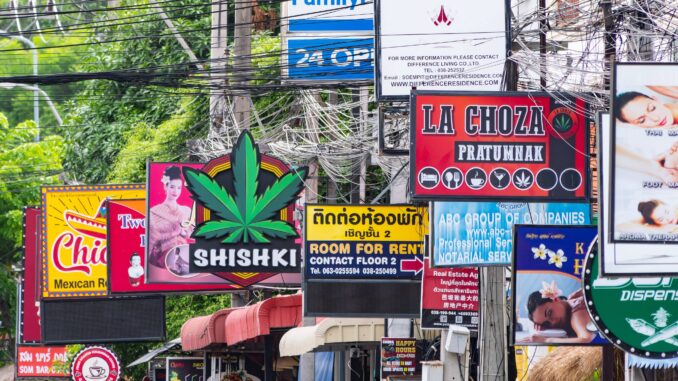
[ad_1]
Thailand will ban the recreational use of cannabis by the end of 2024, the country’s health minister told Reuters last week. The Southeast Asian nation legalized recreational cannabis for adults in 2022, but the country is now walking back legalization following a change in government leadership.
Thailand has been a leader in cannabis policy reform since it became the first Southeast Asian nation to legalize the medicinal use of marijuana in 2018. At the time, Thai leaders said that they hoped legalizing cannabis would provide new opportunities for the country’s agricultural sector.
To prepare for the change in laws, the nation’s health and agriculture ministries worked together to distribute one million cannabis plants for people to grow at home.
That groundbreaking move was followed by the de facto legalization of recreational marijuana four years later when the country removed cannabis from its list of banned substances. The legislation allowed businesses to sell foods and drinks infused with cannabis, provided they contained no more than 0.2% THC. More potent cannabis products were authorized for medical use only.
Because of weak regulations and a lack of enforcement, however, this legalization of weed in Thailand led to the opening of tens of thousands of cannabis shops, many of them geared toward marketing to tourists. The cannabis industry has already become an economic boon for the country and is expected to be worth up to $1.2 billion next year, according to economic projections.
Critics of Thailand’s legalization of recreational cannabis said that the reform was rushed, with regulations adopted within weeks of legalization.
“There are no control measures other than word of mouth,” Mana Nimitmongkol, head of the Anti-Corruption Organization (Thailand), said in a June 2022 online post.
In August 2023, Prime Minister Srettha Thavisin took office, vowing to revisit the legalization of cannabis to rein in widespread recreational sales of marijuana. A month later he declared a new war on drugs as part of his national agenda, which included provisions to scale back the nation’s cannabis policy.
“A consensus has been reached among the 11 coalition parties as well as all other parties in the opposition that the need to tackle the drugs problem is high on the agenda,” he said. “Let’s make today the start of a new fight to stamp out drug problems from society.”
Proposed Law Includes Ban On Recreational Weed
In January, the government issued draft legislation to regulate cannabis in Thailand and asked for public comment on the proposal. The proposal clarifies that only the medical use of cannabis is allowed and that recreational marijuana use is prohibited.
In an interview with Reuters last week, Health Minister Cholnan Srikaew said that the proposed legislation would go to the cabinet for approval in March. The measure would then head to parliament, where approval of the legislation is expected sometime before the end of the year.
“Without the law to regulate cannabis it will be misused,” Cholnan said last week, referring to recreational use, according to a report from Reuters.
“The misuse of cannabis has a negative impact on Thai children,” he added. “In the long run it could lead to other drugs.”
Cholnan said that approximately 20,000 cannabis shops have legally registered with the government. Under the new legislation, unregistered shops will be forced to close. The proposal also discourages home cultivation of cannabis.
“In the new law, cannabis will be a controlled plant, so growing it would require permission,” he said. “We will support (cannabis cultivation) for the medical and health industry.”
The proposed legislation sest a fine of 60,000 baht ($1,700) for the recreational use of cannabis. Those selling cannabis for recreational use or marketing or advertising cannabis flower, extracts, or smoking paraphernalia face sentences of up to one year in jail, a fine of up to 100,000 baht ($2,800) or both. Driving while high on weed would be punishable with a fine of up to 20,000 baht ($560), or one year in jail.
The bill also tightens regulations on cultivating cannabis without a license, with those convicted of such offenses subject to jail terms of one to three years and fines from 20,000 baht ($560) to 300,000 baht ($8,000). Importing, exporting and commercial use of cannabis will require a permit under the legislation.
Because Thailand’s cannabis industry has already become an economic success for the country, the proposed legislation gives businesses time to comply with the new regulations. Cannabis shops that are currently registered with the government will be allowed to continue doing business until their licenses expire. Such businesses will also be permitted to convert to legal cannabis clinics if they comply with all relevant regulations.
Cholnan said that he did not expect the new regulations to impact Thailand’s tourism industry.
[ad_2]
Source link

Soyez le premier à commenter